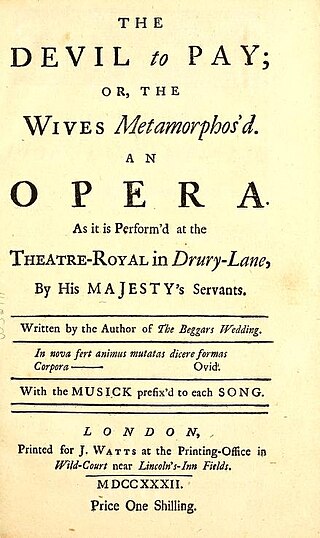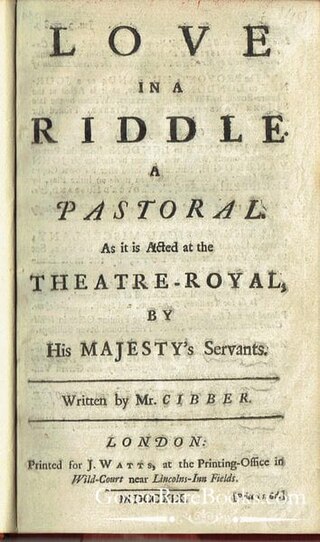
John Rainolds was an English academic and churchman, of Puritan views. He is remembered for his role in the Authorized Version of the Bible, a project of which he was initiator.

The Spartan Dame is a 1719 tragedy by the Irish writer Thomas Southerne. It was inspired by a story from Plutarch's Life of Aegis and was originally written as early 1687, but faced a long period of censorship and revision. The Drury Lane managers chose to revive it at a time of tension with the Stanhope-led government Whigs over licensing issues, and may have selected it because its plot subtly allowed them to demonstrate sympathy with the opposition Whigs led by Robert Walpole following the recent Whig Split.
The Generous Conqueror is a 1701 tragedy by the English writer Bevil Higgons. It was published in January the following year, and is sometimes dated 1702 by this. Higgons was a well-known Jacobite who had been implicated in the 1696 Jacobite assassination plot against William III. In this play he effectively called for the peaceful succession of the pretender to the throne as James III.
Busiris, King of Egypt is a 1719 tragedy by the British writer Edward Young. It is set in Ancient Egypt during the reign of Busiris. It was considered a success, enjoying a good run and was subsequently published by Jacob Tonson. The work was dedicated to the Duke of Newcastle who as Lord Chamberlain oversaw the theatres.
The Man of Taste is a 1735 comedy play by the British writer James Miller. It was a success and was performed numerous times during the theatre season. It is also known by the longer title The Man Of Taste or, The Guardians.

The Village Opera is a 1729 ballad opera by the British writer Charles Johnson. It was part of a group of ballad operas produced in the wake of the great success of John Gay's The Beggar's Opera.

The Provoked Husband is a 1728 comedy play by the British writer and actor Colley Cibber, based on a fragment of play written by John Vanbrugh. It is also known by the longer title The Provok'd Husband: or, a Journey to London.
The Universal Passion is a 1737 comedy play by the British writer James Miller. It is a reworking of Shakespeare's Much Ado About Nothing.
Art and Nature is a 1738 comedy play by the British writer James Miller. The play received a rough reception from what Miller described a "faction" in the Drury Lane audience, and its run was not extended beyond a single night. He described its subsequent publication as an attempt to vindicate himself.
The Coffee House is a 1738 comedy play by the British writer James Miller, written as an afterpiece. After being performed at Drury Lane, it was published later that year with some alterations to the play's original text.

The Devil to Pay is a 1731 ballad opera by the Irish writer Charles Coffey and British writer John Mottley. Also known by the longer title The Devil to Pay: Or, The Wives Metamorphos'd, it was part of a group of ballad operas produced in the wake of the success of John Gay's The Beggar's Opera. The work is inspired by Thomas Jevon's 1686 play The Devil of a Wife.
The Mother-in-Law is a 1734 comedy play by the British writer James Miller. Also known by the longer title The Mother-in-Law, or the Doctor the Disease it debuted at the Haymarket Theatre in London.

Love in a Riddle is a 1729 ballad opera by the British actor-manager Colley Cibber. It was part of a boom in ballad operas inspired by the enormous success of John Gay's The Beggar's Opera the previous year.
The Rival Modes is a 1727 comedy play by the British writer James Moore Smythe.
Love in a Forest is a 1723 comedy play by Charles Johnson. It is a substantial reworking of Shakespeare's As You Like It cutting out characters and passages, while borrowing from other Shakespeare plays amongst other things.

The Country Lasses: or, The Custom of the Manor is a 1715 comedy play by the British writer Charles Johnson.
The Non-Juror is a 1717 comedy play by the British writer Colley Cibber. It is inspired by Molière's 1664 work Tartuffe.

The Cobbler of Preston is a 1716 comedy play by Christopher Bullock, although a separate play of the same title was written by Charles Johnson the same year. A one-act afterpiece is the origin of the phrase "Tis impossible to be sure of anything but Death and Taxes". In the preface to the published version Bullock suggested that he had begun writing the play just four days before its premiere. It takes inspiration from The Taming of the Shrew by William Shakespeare and is set in Preston, Lancashire. The town had recently been scene of fighting during the 1715 Jacobite Rebellion at the Battle of Preston. Bullock's play does not overtly reference the rebellion, but has undertones supportive of the Hanoverian Dynasty.
The Lying Lover; Or, The Lady's Friendship is a 1703 comedy play by the Irish writer Richard Steele. It was his second play, written while he was an army office doing garrison duty in Harwich during the War of the Spanish Succession. It is described as being both a restoration comedy and a sentimental comedy, and marked the transition between the two.
Tamerlane is a 1701 history play by the English writer Nicholas Rowe. A tragedy, it portrays the life of the Timur, the fourteenth century conqueror and founder of the Timurid Empire. Rowe, a staunch Whig, used the historical story as an allegory for the life of William III who resembles his portrayal of Tamerlane while his opponent the Ottoman leader Bayezid I was equivalent to William's longstanding opponent Louis XIV of France. An earlier version of the story Tamburlaine was written by Christopher Marlowe during the Elizabethan era with a very different focus in the context of the English Renaissance.








